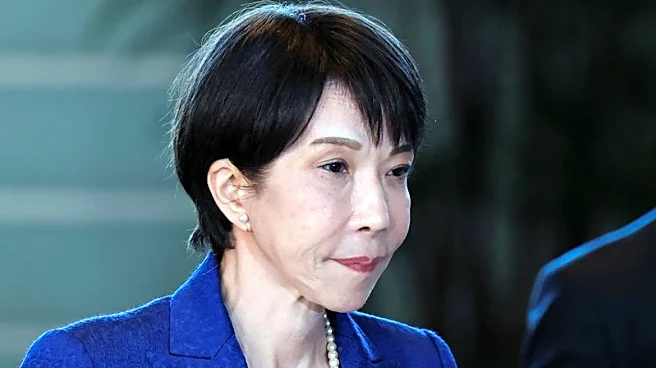What's Happening?
Acclaimed South Korean director Park Chan-wook returned to the Venice Film Festival after 20 years, receiving a six-minute standing ovation for his film 'No Other Choice.' The film, a twisted black comedy, stars Lee Byung-hun and is adapted from Donald E. Westlake's mystery novel 'The Ax.' It follows the story of Man-soo, a middle-aged man who resorts to desperate measures to secure employment after being fired from his job of 25 years. The film's premiere was met with enthusiastic applause, despite starting late due to a previous screening. The audience reacted with laughter and horror to the film's intense scenes, which include graphic moments involving blood and dirt.
Why It's Important?
The reception of 'No Other Choice' highlights Park Chan-wook's continued influence in cinema, particularly in exploring themes of societal breakdown and employment insecurity. The film's success at Venice underscores the global appeal of Korean cinema and its ability to resonate with audiences worldwide. Park's return to Venice after two decades signifies the enduring relevance of his storytelling, especially in addressing universal fears related to job security. This event may further bolster the international presence of Korean filmmakers and actors, potentially leading to more collaborations and opportunities in the global film industry.
What's Next?
Following the positive reception at Venice, 'No Other Choice' is likely to attract attention from international distributors and film festivals, potentially leading to wider releases and screenings. The film's themes of employment insecurity may spark discussions among audiences and critics, possibly influencing future cinematic explorations of similar societal issues. Park Chan-wook's successful return to Venice could also pave the way for more Korean directors to showcase their work on international platforms, contributing to the growing recognition of Korean cinema.
Beyond the Headlines
The film's exploration of employment insecurity and societal breakdown may prompt deeper reflections on the current global economic climate and the challenges faced by individuals in maintaining job stability. The narrative's focus on desperate measures for employment could resonate with audiences experiencing similar fears, highlighting the psychological and social impacts of economic uncertainty. Additionally, the film's success may encourage other filmmakers to tackle complex societal issues through creative storytelling, fostering a broader dialogue on the intersection of art and social commentary.










